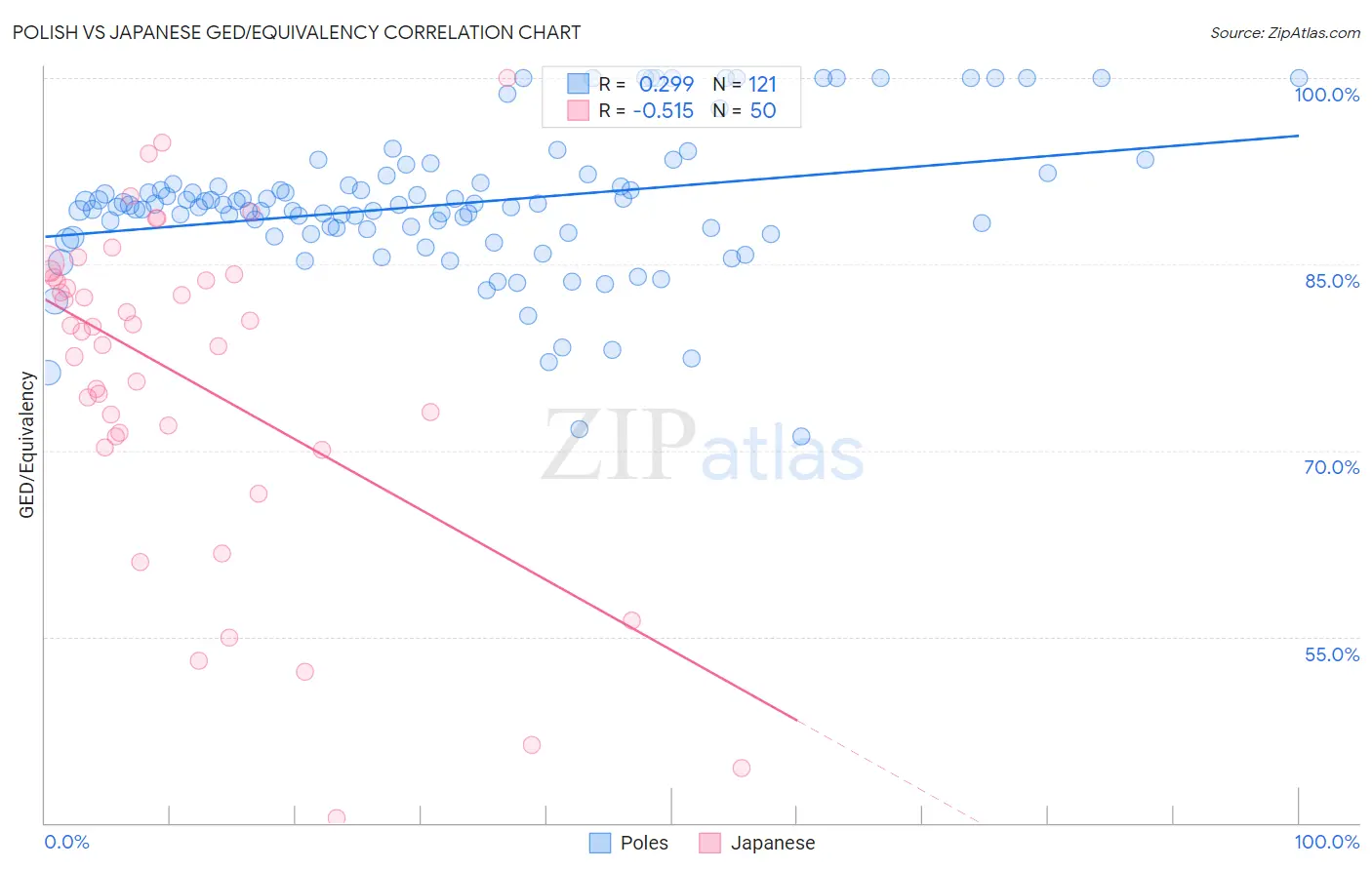Polish vs Japanese GED/Equivalency
COMPARE
Polish
Japanese
GED/Equivalency
GED/Equivalency Comparison
Poles
Japanese
88.5%
GED/EQUIVALENCY
99.8/ 100
METRIC RATING
29th/ 347
METRIC RANK
82.4%
GED/EQUIVALENCY
0.0/ 100
METRIC RATING
287th/ 347
METRIC RANK
Polish vs Japanese GED/Equivalency Correlation Chart
The statistical analysis conducted on geographies consisting of 560,593,858 people shows a weak positive correlation between the proportion of Poles and percentage of population with at least ged/equivalency education in the United States with a correlation coefficient (R) of 0.299 and weighted average of 88.5%. Similarly, the statistical analysis conducted on geographies consisting of 249,183,224 people shows a substantial negative correlation between the proportion of Japanese and percentage of population with at least ged/equivalency education in the United States with a correlation coefficient (R) of -0.515 and weighted average of 82.4%, a difference of 7.4%.

GED/Equivalency Correlation Summary
| Measurement | Polish | Japanese |
| Minimum | 71.1% | 40.4% |
| Maximum | 100.0% | 100.0% |
| Range | 28.9% | 59.6% |
| Mean | 89.8% | 75.8% |
| Median | 89.8% | 79.8% |
| Interquartile 25% (IQ1) | 87.5% | 71.1% |
| Interquartile 75% (IQ3) | 91.5% | 83.9% |
| Interquartile Range (IQR) | 4.1% | 12.8% |
| Standard Deviation (Sample) | 5.8% | 13.3% |
| Standard Deviation (Population) | 5.8% | 13.1% |
Similar Demographics by GED/Equivalency
Demographics Similar to Poles by GED/Equivalency
In terms of ged/equivalency, the demographic groups most similar to Poles are Turkish (88.5%, a difference of 0.020%), Immigrants from Northern Europe (88.5%, a difference of 0.030%), Bhutanese (88.4%, a difference of 0.050%), Immigrants from Lithuania (88.6%, a difference of 0.070%), and Danish (88.4%, a difference of 0.070%).
| Demographics | Rating | Rank | GED/Equivalency |
| Immigrants | Ireland | 99.8 /100 | #22 | Exceptional 88.6% |
| Russians | 99.8 /100 | #23 | Exceptional 88.6% |
| Slovaks | 99.8 /100 | #24 | Exceptional 88.6% |
| Estonians | 99.8 /100 | #25 | Exceptional 88.6% |
| Immigrants | Australia | 99.8 /100 | #26 | Exceptional 88.6% |
| Immigrants | Lithuania | 99.8 /100 | #27 | Exceptional 88.6% |
| Immigrants | Northern Europe | 99.8 /100 | #28 | Exceptional 88.5% |
| Poles | 99.8 /100 | #29 | Exceptional 88.5% |
| Turks | 99.8 /100 | #30 | Exceptional 88.5% |
| Bhutanese | 99.8 /100 | #31 | Exceptional 88.4% |
| Danes | 99.8 /100 | #32 | Exceptional 88.4% |
| Immigrants | Sweden | 99.7 /100 | #33 | Exceptional 88.4% |
| Immigrants | Japan | 99.7 /100 | #34 | Exceptional 88.4% |
| Immigrants | South Central Asia | 99.7 /100 | #35 | Exceptional 88.4% |
| Immigrants | Belgium | 99.7 /100 | #36 | Exceptional 88.3% |
Demographics Similar to Japanese by GED/Equivalency
In terms of ged/equivalency, the demographic groups most similar to Japanese are Immigrants from West Indies (82.4%, a difference of 0.020%), Cajun (82.4%, a difference of 0.040%), Immigrants from Barbados (82.4%, a difference of 0.070%), Pueblo (82.3%, a difference of 0.10%), and Immigrants from Cambodia (82.2%, a difference of 0.18%).
| Demographics | Rating | Rank | GED/Equivalency |
| Cheyenne | 0.1 /100 | #280 | Tragic 82.7% |
| Sioux | 0.1 /100 | #281 | Tragic 82.6% |
| Immigrants | Immigrants | 0.1 /100 | #282 | Tragic 82.6% |
| Indonesians | 0.1 /100 | #283 | Tragic 82.5% |
| Immigrants | Barbados | 0.1 /100 | #284 | Tragic 82.4% |
| Cajuns | 0.0 /100 | #285 | Tragic 82.4% |
| Immigrants | West Indies | 0.0 /100 | #286 | Tragic 82.4% |
| Japanese | 0.0 /100 | #287 | Tragic 82.4% |
| Pueblo | 0.0 /100 | #288 | Tragic 82.3% |
| Immigrants | Cambodia | 0.0 /100 | #289 | Tragic 82.2% |
| Haitians | 0.0 /100 | #290 | Tragic 82.1% |
| Cubans | 0.0 /100 | #291 | Tragic 82.0% |
| Paiute | 0.0 /100 | #292 | Tragic 82.0% |
| British West Indians | 0.0 /100 | #293 | Tragic 82.0% |
| Immigrants | St. Vincent and the Grenadines | 0.0 /100 | #294 | Tragic 82.0% |